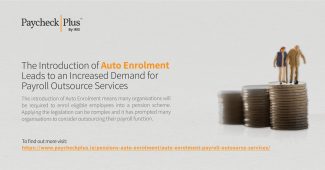Understanding Pension Calculations for your Employees
By law, employers are obligated to offer employees at least one standard Personal Retirement Saving’s Account (PRSA).
Imposed Waiting Period for New Employees:
When an employee is not eligible to join a company pension scheme for the first 6 months of commencing employment, an employer must provide access to a PRSA. This applies to all employers regardless of the size of the workforce and it also applies to all employees regardless of the nature of their contract i.e. fixed-term, casual, full-time, part-time etc.
Employers Who Do Not Have a Pension Scheme in Place:
Employers who do not provide any occupational pension scheme for employees or where there are certain restrictions which apply to occupational pension schemes, are obliged to enter into a contract with a PRSA provider so that the employees can gain access to at least one standard PRSA.
Employers Who Provide a Pension Scheme to New Employees:
If all employees are eligible to join the company pension scheme within six months of joining the company an employer is not obliged to provide access to a PRSA. Employees who contribute to any company pension scheme which does not offer a facility for making additional voluntary contributions, must be given access to a Standard PRSA by the employer.
What if an Employee wants to choose their own PRSA Provider?
If an employee chooses to enter into a contract with another PRSA provider other than the Standard PRSA provided by the employer, the employer is not obliged to make PRSA deductions from the employee’s salary and then pay them over to the employee’s chosen PRSA provider.
Employer’s Obligation
An employer must inform employee’s that they can contribute to a PRSA and employers must also facilitate the PRSA provider with access to employee’s during working hours at the workplace to set up the PRSA. Employers may also provide an employee with paid time off to set up a PRSA.
Any PRSA contributions due for the PRSA provider must be paid by an employer by the 21st of the month, after the month in which they were deducted, with no deduction being allowed for employers’ expenses. For Example, PRSA contributions deducted during the month of April must be paid to the PRSA provider by 21st May.
An employer must notify the employee’s and the PRSA provider, in writing, at least once a month, of the total amount deducted from the employee’s salary and the total amount of the employer’s contributions , if any, in the preceding month. The most efficient way to do this is to show the contributions on an employee’s payslip.
For More on Pension Calculations Read:

The Introduction of Auto Enrolment leads to increased demand for payroll outsource services
There are many reasons why outsourcing company payroll operations can benefit a business, but the arrival of complicated legal obligations…
Paycheck Plus, Your Outsourced Payroll Provider
Paycheck Plus understand that payroll is a complex and time-consuming operation. Keeping up to date with ever evolving legislative changes, ensuring payroll compliance and delivering employee wages accurately and on time takes its toll on a business’ senior resources. As Ireland’s most highly accredited payroll provider, we have been providing outstanding payroll outsourcing services to each of our client’s needs for nearly twenty years. Our award-winning team of payroll experts specialise in all aspects of payroll, including payroll consultancy, payroll audits, payroll reporting, payroll training while our employee assist helpline and online payslip portal can address your employee’s queries and needs.
To ensure payroll accuracy or for more information on our Irish payroll service simply request a callback now or call our payroll bureau on (0)1 905 9400. Alternatively, request a payroll quote here.


